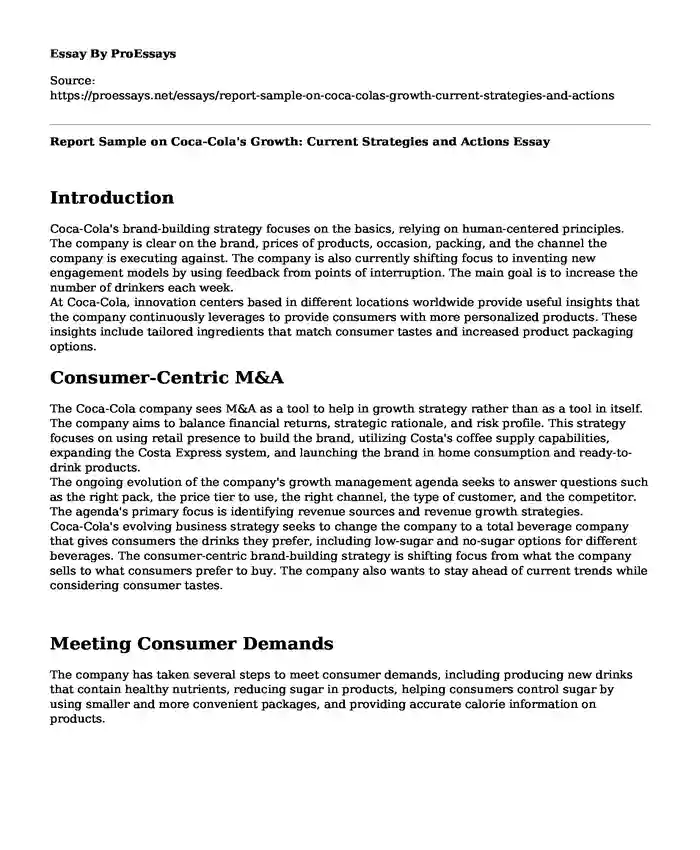Introduction
Coca-Cola's brand-building strategy focuses on the basics, relying on human-centered principles. The company is clear on the brand, prices of products, occasion, packing, and the channel the company is executing against. The company is also currently shifting focus to inventing new engagement models by using feedback from points of interruption. The main goal is to increase the number of drinkers each week.
At Coca-Cola, innovation centers based in different locations worldwide provide useful insights that the company continuously leverages to provide consumers with more personalized products. These insights include tailored ingredients that match consumer tastes and increased product packaging options.
Consumer-Centric M&A
The Coca-Cola company sees M&A as a tool to help in growth strategy rather than as a tool in itself. The company aims to balance financial returns, strategic rationale, and risk profile. This strategy focuses on using retail presence to build the brand, utilizing Costa's coffee supply capabilities, expanding the Costa Express system, and launching the brand in home consumption and ready-to-drink products.
The ongoing evolution of the company's growth management agenda seeks to answer questions such as the right pack, the price tier to use, the right channel, the type of customer, and the competitor. The agenda's primary focus is identifying revenue sources and revenue growth strategies.
Coca-Cola's evolving business strategy seeks to change the company to a total beverage company that gives consumers the drinks they prefer, including low-sugar and no-sugar options for different beverages. The consumer-centric brand-building strategy is shifting focus from what the company sells to what consumers prefer to buy. The company also wants to stay ahead of current trends while considering consumer tastes.
Meeting Consumer Demands
The company has taken several steps to meet consumer demands, including producing new drinks that contain healthy nutrients, reducing sugar in products, helping consumers control sugar by using smaller and more convenient packages, and providing accurate calorie information on products.
Strengths, Weaknesses, Opportunities, and Threats (SWOT) Matrix
Coca-Cola is currently carefully reviewing its SWOT analysis to help make the right strategic decisions. The company is utilizing an interactive process that ensures coordination among all the departments, such as operations, logistics, human resource, finance, and strategic planning, and management information systems. The table below is a SWOT matrix that outlines the strengths, weaknesses, opportunities, and threats of the Coca-Cola company.
WO strategies
Increased technological development in the company is paving the way for the adoption of more efficient inventory methods. The adoption of these new methods is in line with the company's innovation strategy. The growing population offers a broader market for the company, enabling the company's products to reach a larger population, which helps in brand-building. New technologies allow for the company to devise a decision-making system that lets all employees have a say in the decisions made in the company.
ST strategies
Automation of record-keeping of daily sales contributes to the innovation strategy and helps save time and money and helps in revenue growth management. Problems that arise due to cash flow problems can be solved using skilled workers who can manage finances efficiently, thus increasing cash flow leading to better revenue management. Innovation solutions to ensure decentralized decision-making contribute to the company's innovation strategy and helps make better informed decisions.
WT Strategies
The company needs to adopt new methods of keeping inventory to eliminate the problem of a large number of daily sales inventories. The company's adoption of more creative advertisement methods will attract more customers, thus reducing competition. Low worker morale can be eliminated by adopting creative ways of rewarding workers, such as vacations and promotions.
Conclusion
The innovation approach has been refined through ten innovation centers that help the company understand consumer trends in the present and the future. Metrics to measure progress such as an ambidextrous culture, innovations scorecard, balanced portfolio approach, system leadership reviews, and benchmarking in peer companies helps the company track progress.
References
Bohare, S. (2019, September 11). Coca-Cola & Content-Based Marketing Strategy. Retrieved July 25, 2020, from https://medium.com/touchstorm/coca-cola-content-based-marketing-strategy-ae9d561e46cb
Coca-Cola: Driving success with AI and Big Data. (n.d.). Retrieved July 25, 2020, from https://www.bernardmarr.com/default.asp?contentID=1280
Growth Strategy. (2020). Retrieved July 25, 2020, from
https://investors.coca-colacompany.com/strategy/growth-strategy
Jurevicius, O. (2020, January 10). Coca Cola SWOT Analysis (6 Key Strengths in 2020). Retrieved July 25, 2020, from https://strategicmanagementinsight.com/swot-analyses/coca-cola-swot-analysis.html
New Focus on Choice, Convenience, and Consumers - News & Articles. (2017). Retrieved July 25, 2020, from https://www.coca-colacompany.com/news/new-focus-on-choice-convenience-and-consumers
Cite this page
Report Sample on Coca-Cola's Growth: Current Strategies and Actions. (2023, Oct 17). Retrieved from https://proessays.net/essays/report-sample-on-coca-colas-growth-current-strategies-and-actions
If you are the original author of this essay and no longer wish to have it published on the ProEssays website, please click below to request its removal:
- Essay Sample on Target's Stakeholder Relationships
- Essay on Pizza Hut Reaps Benefits From Technology: Innovative Sales Processes
- Essay Example on Breach Avoidance: It Can Be Done, It Must Be Done
- Paper Example on Strategic Control for Successful Implementation of Strategic Plan
- Essay Example on Eleanor Roosevelt: Defining Leadership & Putting It Into Practice
- Essay Sample on Recruiting Qualified Candidates for Hotel to Thrive in Spain
- Research Paper Example on Childhood Obesity in US: An Observational Study







